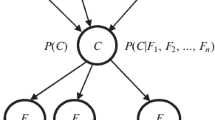Abstract
Traditional discriminative training methods modify Hidden Markov Model (HMM) parameters obtained via a Maximum Likelihood (ML) criterion based estimator. In this paper, anti-models are introduced instead. The anti-models are used in tandem with ML models to incorporate a discriminative information from training data set and modify the HMM output likelihood in a discriminative way. Traditional discriminative training methods are prone to over-fitting and require an extra stabilization. Also, convergence is not ensured and usually “a proper” number of iterations is done. In the proposed anti-models concept, two parts, positive model and anti-model, are trained via ML criterion. Therefore, the convergence and the stability are ensured.
Access this chapter
Tax calculation will be finalised at checkout
Purchases are for personal use only
Preview
Unable to display preview. Download preview PDF.
Similar content being viewed by others
References
Vanek, J., Trmal, J., Psutka, J.V., Psutka, J.: Optimized Acoustic Likelihoods Computation for NVIDIA and ATI/AMD Graphics Processors. IEEE Transactions on Audio, Speech and Language Processing 20(6), 1818–1828 (2012)
Vanek, J., Trmal, J., Psutka, J., Psutka, J.: Full Covariance Gaussian Mixture Models Evaluation on GPU. In: Proc. IEEE ISSPIT, Vietnam, Ho Chi Minh City (2012)
Heigold, G., Schlüter, R., Ney, H., Wiesler, S.: Discriminative Training for Automatic Speech Recognition: Modeling, Criteria, Optimization, Implementation, and Performance. IEEE Signal Processing Magazine 29, 58–69 (2012), doi:10.1109/MSP.2012.2197232
Radová, V., Psutka, J.: UWB_S01 Corpus – A Czech Read-Speech Corpus. In: Proc. of the ICSLP 2000, Beijing, China, pp. 732–735 (2000)
Normandin, Y., Morgera, D.: An Improved MMIE Training Algorithm for Speaker-Independent Small Vocabulary, Continuous Speech Recognition. In: Proc. of the IEEE, ICASSP 1991, Toronto, Canada, pp. 537–540 (1991)
Kapadia, S.: Discriminative Training of Hidden Markov Models. Ph.D. thesis, Cambridge University, Department of Engineering (1998)
Povey, D.: Discriminative Training for Large Vocabulary Speech Recognition. Ph.D. thesis, Cambridge University, Department of Engineering (2003)
Bahl, L.R., et al.: Maximum Mutual Information Estimation of Hidden Markov Model Parameters for Speech Recognition. In: ICASSP 1986, Tokyo, Japan (1986)
Povey, D., et al.: Improved discriminative training techniques for large vocabulary continuous speech recognition. In: ICASSP 2001, Salt Lake City, Utah, USA, pp. 45–48 (2001)
Povey, D., Woodland, P.C.: Minimum Phone Error and I-Smoothing for Improved Discriminative Training. In: Proc. ICASSP 2002, Orlando, USA (2002)
Katagiri, S., Lee, C.-H., Juang, B.-H.: New Discriminative Training Algorithms Based on the Generalized Descent Method. In: Proc. IEEE Neural Networks for Signal Processing, pp. 299–308 (1991)
Juang, B.-H., Katagiri, S.: Discriminative Learning for Minimum Error Classification. IEEE Transactions on Acoustic, Speech and Signal Processing 40(12), 3043–3054 (1992)
Chou, W., Juang, B.-H., Lee, C.-H.: Segmental GDP Training of HMM Based Speech Recognizer. In: Proc. ICASSP, vol. 1, pp. 473–476 (1992)
Povey, D., Kanevsky, D., Kingsbury, B., Ramabhadran, B., Saon, G., Visweswariah, K.: Boosted MMI for Model and Feature-Space Discriminative Training. In: Proc. ICASSP 2008, Las Vegas, USA, pp. 4057–4060 (2008)
Povey, D., Woodland, P.C., Gales, M.J.F.: Discriminative MAP for Acoustic Model Adaptation. In: Proc. ICASSP 2003, Hong Kong, pp. pp. I–312 (2003)
Zheng, J., Stolcke, A.: Improved Discriminative Training. Using Phone Lattices. In: Proc. Eurospeech 2005, Lisbon, Portugal (2005)
Bell, P.: Full Covariance Modelling for Speech Recognition. Ph.D. Thesis, The University of Edinburgh
Lee, Y., Lee, K.Y., Lee, J.: The Estimating Optimal Number of Gaussian Mixtures Based on Incremental k-means for Speaker Identification. International Journal of Information Technology 12(7), 13–21 (2006)
Figueiredo, M., Leitão, J., Jain, A.: On Fitting Mixture Models. In: Hancock, E.R., Pelillo, M. (eds.) EMMCVPR 1999. LNCS, vol. 1654, pp. 54–69. Springer, Heidelberg (1999)
Mclachlan, G.J., Peel, D.: On a Resampling Approach to Choosing the Number of Components in Normal Mixture Models. Computing Science and Statistics 28, 260–266 (1997)
Paclík, P., Novovičová, J.: Number of Components and Initialization in Gaussian Mixture Model for Pattern Recognition. In: Proc. Artificial Neural Nets and Genetic Algorithms, pp. 406–409. Springer, Wien (2001)
Vaněk, J., Machlica, L., Psutka, J., Psutka, J.: Covariance Matrix Enhancement Approach to Train Robust Gaussian Mixture Models of Speech Data. In: Železný, M., Habernal, I., Ronzhin, A. (eds.) SPECOM 2013. LNCS, vol. 8113, pp. 92–99. Springer, Heidelberg (2013)
Pražák, A., Psutka, J.V., Hoidekr, J., Kanis, J., Müller, L., Psutka, J.?: Automatic online subtitling of the Czech parliament meetings. In: Sojka, P., Kopeček, I., Pala, K., et al. (eds.) TSD 2006. LNCS (LNAI), vol. 4188, pp. 501–508. Springer, Heidelberg (2006)
Author information
Authors and Affiliations
Editor information
Editors and Affiliations
Rights and permissions
Copyright information
© 2014 Springer International Publishing Switzerland
About this paper
Cite this paper
Vaněk, J., Psutka, J. (2014). Anti-Models:. In: Sojka, P., Horák, A., Kopeček, I., Pala, K. (eds) Text, Speech and Dialogue. TSD 2014. Lecture Notes in Computer Science(), vol 8655. Springer, Cham. https://doi.org/10.1007/978-3-319-10816-2_54
Download citation
DOI: https://doi.org/10.1007/978-3-319-10816-2_54
Publisher Name: Springer, Cham
Print ISBN: 978-3-319-10815-5
Online ISBN: 978-3-319-10816-2
eBook Packages: Computer ScienceComputer Science (R0)




